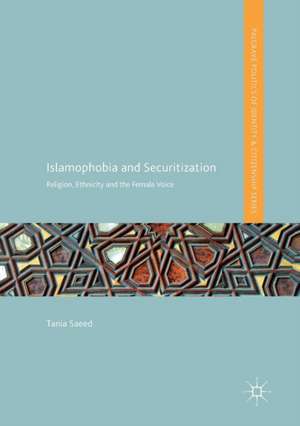Islamophobia and Securitization: Religion, Ethnicity and the Female Voice: Palgrave Politics of Identity and Citizenship Series
Autor Tania Saeeden Limba Engleză Paperback – 28 iun 2018
rest to scholars and students researching Muslims in the West, in particular sociologists, anthropologists, and political scientists. It will also appeal to analysts and academics researching security and terrorism, race and racialization, as well as gender, immigration, and diaspora.
Din seria Palgrave Politics of Identity and Citizenship Series
- 15%
 Preț: 640.06 lei
Preț: 640.06 lei - 20%
 Preț: 819.15 lei
Preț: 819.15 lei -
 Preț: 211.29 lei
Preț: 211.29 lei -
 Preț: 385.08 lei
Preț: 385.08 lei -
 Preț: 394.51 lei
Preț: 394.51 lei - 15%
 Preț: 580.36 lei
Preț: 580.36 lei -
 Preț: 391.61 lei
Preț: 391.61 lei - 15%
 Preț: 587.20 lei
Preț: 587.20 lei - 18%
 Preț: 730.97 lei
Preț: 730.97 lei -
 Preț: 388.34 lei
Preț: 388.34 lei -
 Preț: 394.51 lei
Preț: 394.51 lei -
 Preț: 390.63 lei
Preț: 390.63 lei -
 Preț: 393.52 lei
Preț: 393.52 lei - 15%
 Preț: 588.18 lei
Preț: 588.18 lei - 15%
 Preț: 637.59 lei
Preț: 637.59 lei - 18%
 Preț: 904.43 lei
Preț: 904.43 lei -
 Preț: 390.63 lei
Preț: 390.63 lei -
 Preț: 387.20 lei
Preț: 387.20 lei -
 Preț: 396.40 lei
Preț: 396.40 lei -
 Preț: 386.22 lei
Preț: 386.22 lei -
 Preț: 384.31 lei
Preț: 384.31 lei -
 Preț: 389.70 lei
Preț: 389.70 lei -
 Preț: 389.70 lei
Preț: 389.70 lei - 15%
 Preț: 583.61 lei
Preț: 583.61 lei -
 Preț: 389.70 lei
Preț: 389.70 lei -
 Preț: 268.23 lei
Preț: 268.23 lei -
 Preț: 386.81 lei
Preț: 386.81 lei - 15%
 Preț: 692.09 lei
Preț: 692.09 lei -
 Preț: 388.72 lei
Preț: 388.72 lei -
 Preț: 394.51 lei
Preț: 394.51 lei -
 Preț: 388.72 lei
Preț: 388.72 lei - 15%
 Preț: 699.45 lei
Preț: 699.45 lei - 15%
 Preț: 701.90 lei
Preț: 701.90 lei -
 Preț: 388.72 lei
Preț: 388.72 lei -
 Preț: 213.58 lei
Preț: 213.58 lei - 15%
 Preț: 534.69 lei
Preț: 534.69 lei -
 Preț: 388.72 lei
Preț: 388.72 lei -
 Preț: 390.63 lei
Preț: 390.63 lei
Preț: 198.78 lei
Nou
Puncte Express: 298
Preț estimativ în valută:
38.04€ • 41.31$ • 31.95£
38.04€ • 41.31$ • 31.95£
Carte tipărită la comandă
Livrare economică 23 aprilie-07 mai
Preluare comenzi: 021 569.72.76
Specificații
ISBN-13: 9783319813462
ISBN-10: 3319813463
Pagini: 235
Ilustrații: XIII, 235 p.
Dimensiuni: 148 x 210 mm
Greutate: 0.3 kg
Ediția:Softcover reprint of the original 1st ed. 2016
Editura: Springer International Publishing
Colecția Palgrave Macmillan
Seria Palgrave Politics of Identity and Citizenship Series
Locul publicării:Cham, Switzerland
ISBN-10: 3319813463
Pagini: 235
Ilustrații: XIII, 235 p.
Dimensiuni: 148 x 210 mm
Greutate: 0.3 kg
Ediția:Softcover reprint of the original 1st ed. 2016
Editura: Springer International Publishing
Colecția Palgrave Macmillan
Seria Palgrave Politics of Identity and Citizenship Series
Locul publicării:Cham, Switzerland
Cuprins
Gender, Islamophobia and the Security Discourse: An Introduction .- 1. Muslims, South Asians and the Pakistani community in Britain: Intersecting Security, Identity and Belonging 2.- Securitizing the Muslim Female: Islamophobia and the Hidden Terrorist.- 3. Securitizing the Educated Muslim: Islamophobia, Radicalization and the ISoc Sisters.- 4. Securitizing the Ethno-Religious Identity(s): Exploring Islamophobia as Pakophobia.- 5. Challenging Islamophobia and the Security Discourse: Dialogue and the Muslim Activist.- Conclusion: Gender, Islamophobia and the Security Discourse: Future Challenges
Recenzii
“This book is a highly critical academic insight into unexplored and explored themes around radicalisation, race, colonialism, immigration, multiculturalism, gender, security and terrorism. Saeed compiles, in an informed and accessible writing style, the voices of resistance in young Muslim women in the UK from within the educational system and beyond … .” (Fernán Osorno Hernández, Network, 2018)
Notă biografică
Tania Saeed is Assistant Professor at Lahore University of Management Sciences, Pakistan. Her area of specialization is democratization and social exclusion with a focus on religious minorities, gender, and security in the context of the United Kingdom and Pakistan.
Textul de pe ultima copertă
This book explores everyday realities of young Muslim women in Britain, who are portrayed as antithetical to the British way of life in media and political discourse. The book captures how geo-political events, and national tragedies continue to implicate individuals and communities at the domestic and local level, communities that have no connection to such tragedies and events, other than being associated with a religio-ethnic identity. The author shows how Muslim women are caught within the spectrum of the vulnerable-fanatic, always perceived to be ‘at risk’ of being 'radicalized'. Focusing on educated Muslim females, the book explores experiences of Islamophobia and securitization inside and outside educational institutions, and highlights individual and group acts of resistance through dialogue, with Muslim women challenging the metanarrative of insecurity and suspicion that plagues their everyday existence in Britain. Islamophobia and Securitization will be of inte
rest to scholars and students researching Muslims in the West, in particular sociologists, anthropologists, and political scientists. It will also appeal to analysts and academics researching security and terrorism, race and racialization, as well as gender, immigration, and diaspora.
rest to scholars and students researching Muslims in the West, in particular sociologists, anthropologists, and political scientists. It will also appeal to analysts and academics researching security and terrorism, race and racialization, as well as gender, immigration, and diaspora.
Caracteristici
Provides an interdisciplinary study which combines gender studies and security discourses Moves beyond analysis of Muslims as a single category Analyses the grassroots female Muslim experience in the UK
